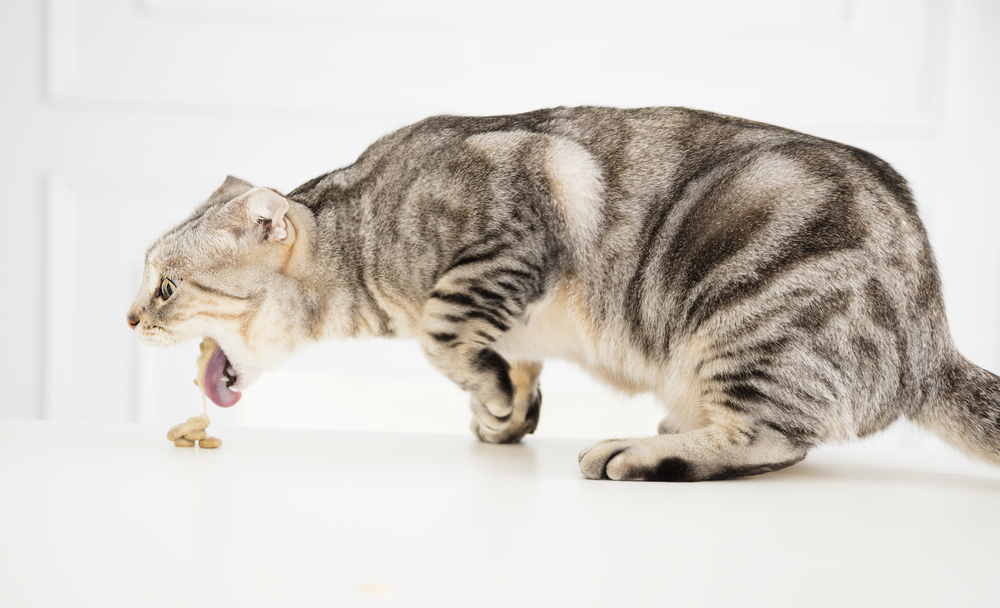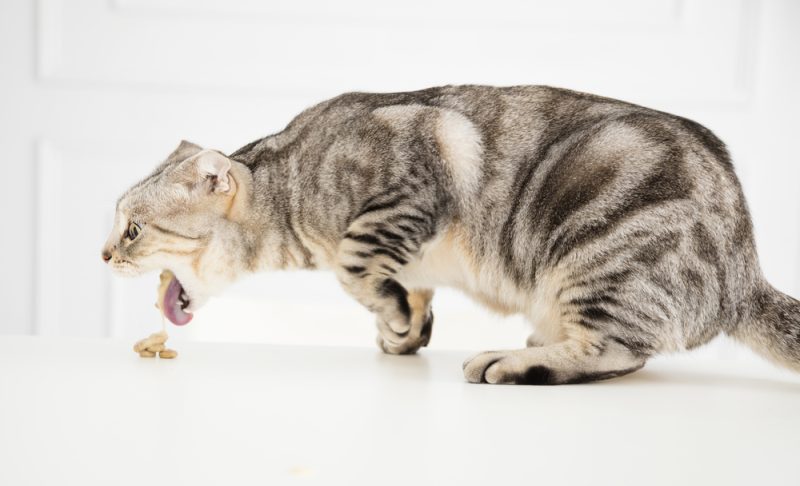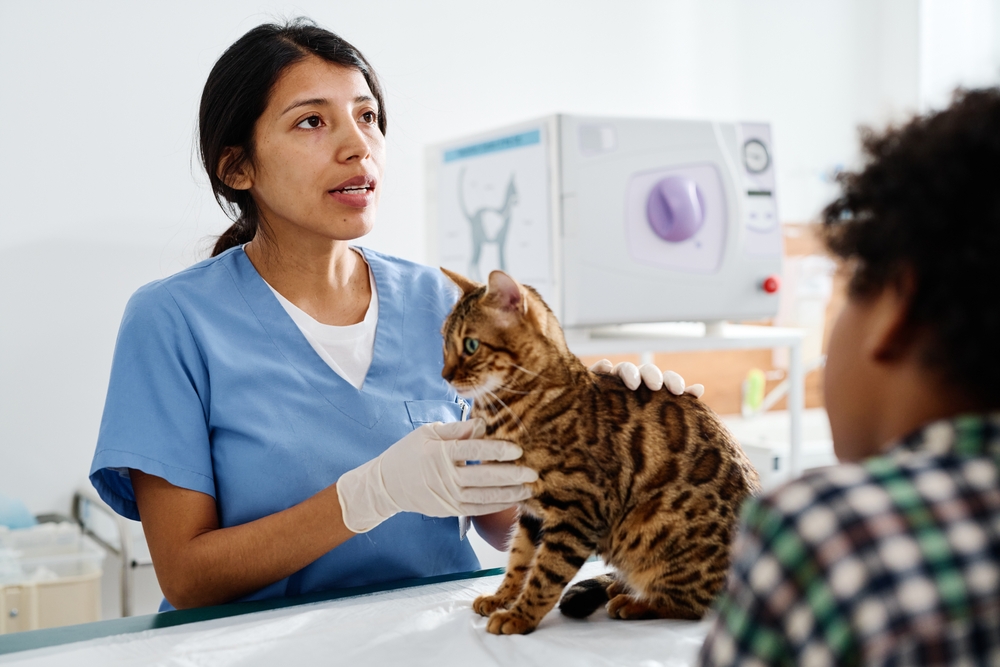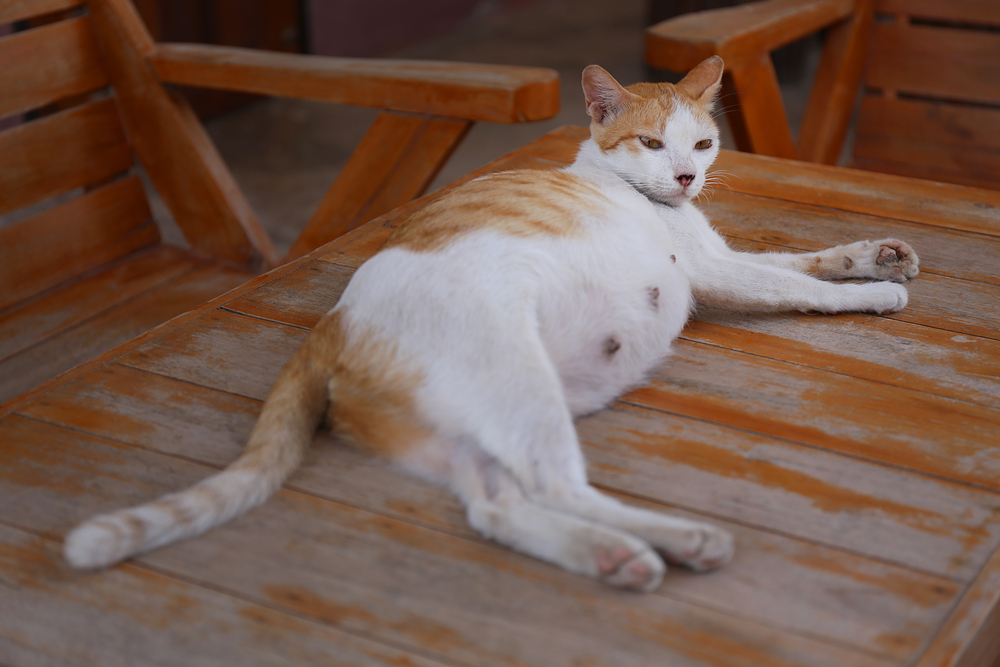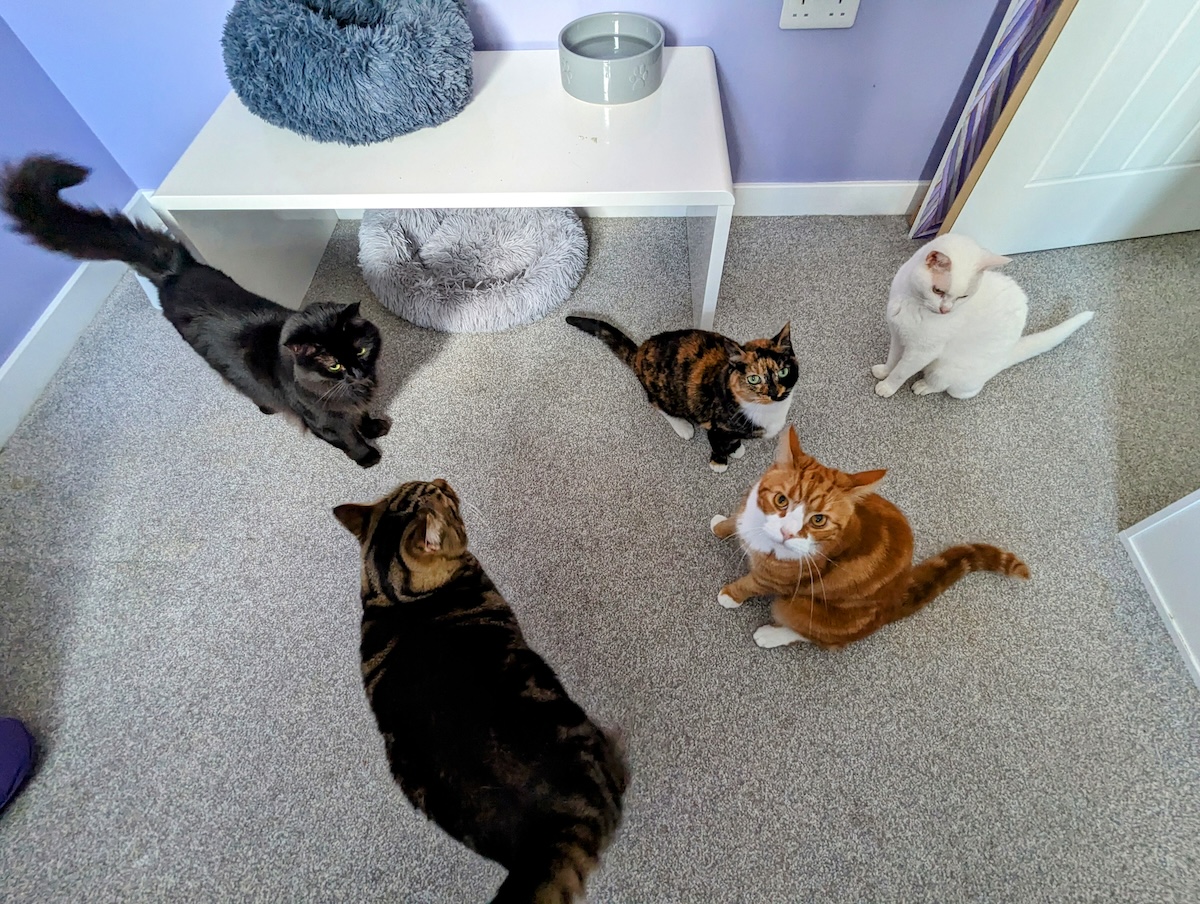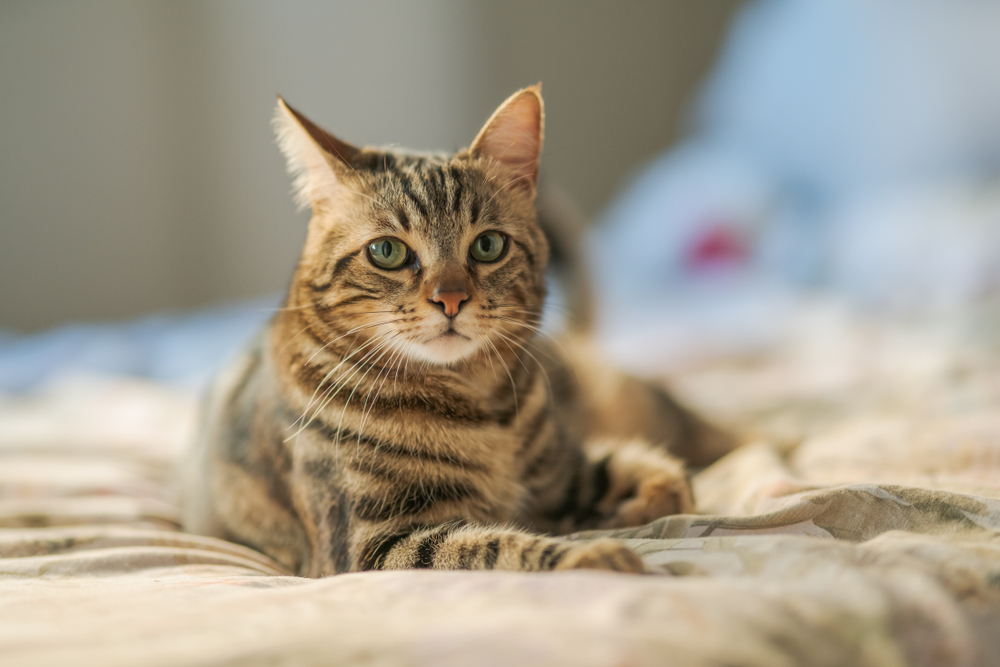The sound of a vomiting cat is one no pet owner wants to hear. However, after the initial dismay wears off, you may wonder—Is this concerning? Why is my cat throwing up, and what should I do? Vomiting in felines may occur with a wide range of potential health issues, some being more serious than others. In the following guide, we will discuss how to identify vomiting, possible causes, when to seek veterinary care, how to treat vomiting in cats, and how to keep your feline friend healthy.
What Does Vomiting Look Like?
While the identification of vomiting may seem straightforward, it can easily be confused with other processes such as regurgitation. Vomiting in felines will be distinguished by active heaving or retching. The vomitus may contain partially digested food or bile and can vary in color. Signs of nausea such as lip licking, and increased salivation may be noted before vomiting.
Regurgitation is a passive process; therefore, no abdominal contractions or retching will be noted. Cats that regurgitate usually do so soon after eating and will bring up undigested food that is often covered in mucous and has a tubular shape. Differentiating between vomiting and regurgitation is important, as the possible causes for these processes may differ.

Possible Causes of Vomiting
- Toxins: Many different toxins are implicated in causing vomiting in cats. Common toxic substances for felines include house plants (lilies, poinsettias), human medications (Acetaminophen/Tylenol), Ethylene glycol (antifreeze), fertilizers, and canine flea and tick medication containing pyrethrin/pyrethroids.
- Gastrointestinal Foreign Body: Ingestion of foreign material may cause inflammation and potentially either partial or complete obstruction of the stomach or intestines. Cats and kittens are notorious for linear foreign bodies, which can lead to life-threatening intestinal perforation.
- Gastrointestinal parasites: Common gastrointestinal (GI) parasites that may cause vomiting in felines include roundworms and tapeworms. Symptoms of GI parasites in felines also include diarrhea, inappetence, and a pot-bellied appearance.
- Pancreatitis: Pancreatitis, or inflammation of the pancreas, is commonly seen in cats. Feline pancreatitis may be either acute or chronic and is most often noted to be idiopathic (of unknown cause).
- Renal disease: Acute renal (kidney) failure is a serious medical condition of cats that often presents with vomiting. There are many potential causes of renal failure in cats, including ureteral or urethral obstruction, toxin ingestion, or pyelonephritis. Cats with chronic renal failure may also experience vomiting.
- Endocrine disease: Hyperthyroidism is an endocrine disease commonly seen in older cats. In addition to vomiting, symptoms of hyperthyroidism include weight loss, diarrhea, increased appetite, and a poor hair coat.
- Inflammatory Bowel Disease: Feline inflammatory bowel disease (IBD) is a chronic, inflammatory condition of the GI tract. In addition to vomiting, weight loss, diarrhea, lethargy, and inappetence may also be noted with IBD. Symptoms associated with IBD in felines may overlap with those of intestinal lymphoma, and the two conditions may be challenging to differentiate.
While the above list details common causes of vomiting in felines, the list of medical conditions which may present with vomiting is extensive. Additional causes of feline vomiting may also include, but are not limited to, heartworm disease, heart failure, bacterial or viral infection, food allergy, dietary indiscretion, or constipation. Hairballs are also commonly blamed for vomiting in cats; however, the frequent vomiting of hairballs is often secondary to an underlying medical issue, such as poor GI motility.
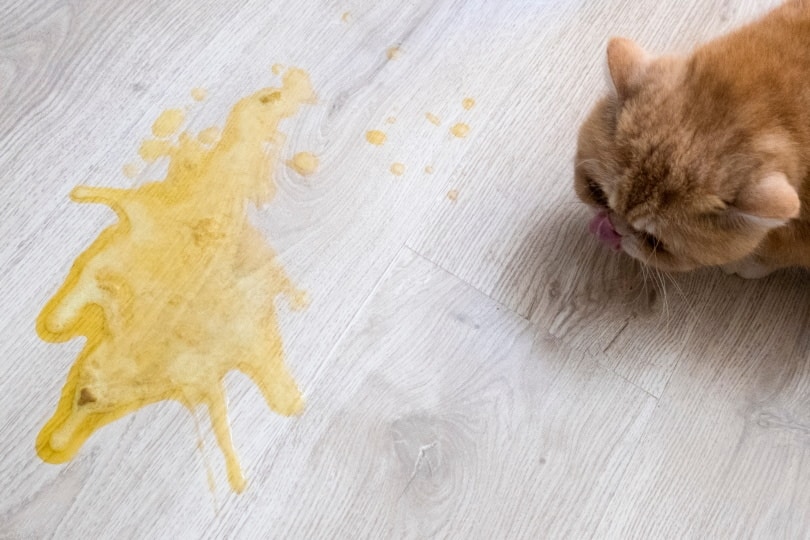
When to Seek Veterinary Care
Sporadic vomiting in an otherwise normal feline may not always require further evaluation by a veterinarian. However, the following signs represent instances when a trip to the veterinary clinic may be warranted:
- Chronic vomiting: Chronic, persistent vomiting in an otherwise healthy-seeming cat should be evaluated by a veterinarian. Even if the vomiting is occurring relatively infrequently (a few times per month, for example), its persistence may indicate an underlying issue such as food intolerance, IBD, neoplasia, or early metabolic disease.
- Acute, frequent vomiting: Noting multiple episodes of vomiting within a short period is always concerning and requires further evaluation.
- Lethargy: Lethargic cats may seem less playful, spend more time hiding or sleeping, and not enjoy participation in their usual activities. Lethargy in conjunction with vomiting in felines always requires veterinary attention.
- Decrease in appetite and water consumption: Whether gradual or more sudden—changes in your cat’s eating or drinking habits should be promptly evaluated by a veterinarian. In the face of vomiting decreased water consumption can rapidly lead to dehydration, which may require treatment by your veterinarian.
- Weight Loss: Weight loss in cats may seem subtle and can sometimes be difficult to distinguish when you are with your cat every day. However, even a small amount of unintentional weight loss in felines is often significant, especially when coupled with vomiting—if you have any concerns that your cat’s weight might be down, scheduling a veterinary visit is in order.
- Known ingestion of a foreign substance or toxin: From chicken bones to human medications, cats can get into all sorts of things that they shouldn’t. If you witness your cat vomiting after ingesting something other than their food or normal treats, a prompt call to your veterinarian is recommended—they will be best able to advise you whether further action is needed. An additional resource, Pet Poison Helpline, can also provide guidance in the case of toxin ingestion.
- Changes in urination or defecation: Either increases or decreases in your cat’s urination or defecation require veterinary follow-up. Changes in litter box habits can have a wide range of possible causes and will likely require diagnostic testing for further evaluation and identification of the underlying problem. Vomiting in the face of decreased urine production (or along with frequent, non-productive trips to the litter box) may be indicative of urinary obstruction in male cats; this is a life-threatening emergency that requires immediate veterinary attention.
While the above scenarios suggest a trip to the veterinarian is needed, it is by no means an exhaustive list of concerning symptoms. If you have any concerns about your cat’s health, or to further evaluate why they may be throwing up, a discussion with your veterinarian is recommended.
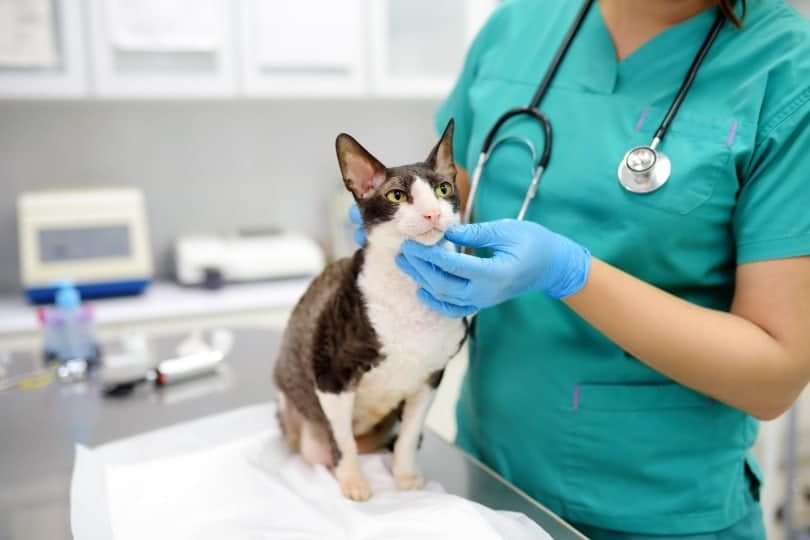
Diagnostics for the Vomiting Feline
At your veterinary clinic, a full physical exam will be performed and a history detailing your cat’s symptoms will be obtained to help determine the cause for their vomiting.
- Blood work: Complete blood count, chemistry, and T4 (thyroid) level
- Radiographs (X-rays)
- Urinalysis
- Fecal examination
Depending on your cat’s results and the suspected cause of vomiting further diagnostics, such as abdominal ultrasound, may also be recommended.
Treatment for Vomiting in Cats
Treatment for vomiting in cats is often dependent on the underlying cause and may vary widely depending on the specific condition present. However, in many cases symptomatic or supportive care for vomiting may also be recommended by your veterinarian. This may include:
- Cerenia: Cerenia (maropitant citrate) is an injectable, antiemetic medication approved to treat vomiting in cats 4 months of age and older.
- Fluid therapy: Cats that have been vomiting may also be dehydrated. Administration of fluids via either intravenous or subcutaneous routes can help to improve hydration.
- Bland diet: Your veterinarian may recommend a bland diet to help settle the stomach of your vomiting cat. Easily digestible, veterinary prescription diets are available for this specific purpose and may be recommended by your veterinarian. You can also discuss whether making a homemade bland diet may be appropriate for your cat.
Keeping Your Cat Healthy
Dealing with a vomiting pet can be stressful. Partnering with your veterinarian to provide the best care for your feline friend can help reduce the anxiety that comes along with a sick pet.
- Regular veterinary visits: Annual or biannual exams with your veterinarian can help spot potential problems early before illness has a chance to progress. Symptoms that may accompany vomiting, such as weight loss, may be noted on a routine visit and prompt further evaluation. Mild abnormalities can also be caught on routine lab work and may signify the need for further testing or treatment.
- Keeping harmful items out of reach: Human medications, food, houseplants, flowers, and household chemicals may all be dangerous if ingested. These items, along with less-obvious dangers such as hair ties and bits of string, can all lead to vomiting and serious illness in curious felines. Keeping potential hazards put away can greatly minimize your cat’s risk for vomiting.
- Feeding a high-quality feline diet: Proper nutrition will help your cat to live a long, healthy life. Feeding a diet specific to your cat’s life stage, that has been approved by the Association of American Feed Control Officials (AAFCO) will ensure your cat is getting an appropriate balance of nutrients and calories needed to thrive.
Keeping your cat happy and healthy, and your carpet vomit-free is a common aspiration of many a cat owner. When vomiting is an issue, however, an understanding of possible causes, signs of concern, and what to expect from a veterinary visit can help to make the experience less stressful. By working with your veterinarian and providing a safe environment for your cat at home, you can help your feline to flourish!
Featured Image Credit: Tom Wang, Shutterstock

